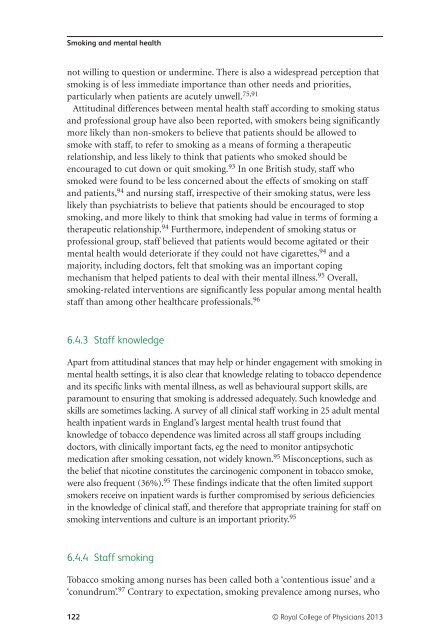Smoking and mental health - NCSCT
Smoking and mental health - NCSCT
Smoking and mental health - NCSCT
You also want an ePaper? Increase the reach of your titles
YUMPU automatically turns print PDFs into web optimized ePapers that Google loves.
<strong>Smoking</strong> <strong>and</strong> <strong>mental</strong> <strong>health</strong><br />
not willing to question or undermine. There is also a widespread perception that<br />
smoking is of less immediate importance than other needs <strong>and</strong> priorities,<br />
particularly when patients are acutely unwell. 75,91<br />
Attitudinal differences between <strong>mental</strong> <strong>health</strong> staff according to smoking status<br />
<strong>and</strong> professional group have also been reported, with smokers being significantly<br />
more likely than non-smokers to believe that patients should be allowed to<br />
smoke with staff, to refer to smoking as a means of forming a therapeutic<br />
relationship, <strong>and</strong> less likely to think that patients who smoked should be<br />
encouraged to cut down or quit smoking. 93 In one British study, staff who<br />
smoked were found to be less concerned about the effects of smoking on staff<br />
<strong>and</strong> patients, 94 <strong>and</strong> nursing staff, irrespective of their smoking status, were less<br />
likely than psychiatrists to believe that patients should be encouraged to stop<br />
smoking, <strong>and</strong> more likely to think that smoking had value in terms of forming a<br />
therapeutic relationship. 94 Furthermore, independent of smoking status or<br />
professional group, staff believed that patients would become agitated or their<br />
<strong>mental</strong> <strong>health</strong> would deteriorate if they could not have cigarettes, 94 <strong>and</strong> a<br />
majority, including doctors, felt that smoking was an important coping<br />
mechanism that helped patients to deal with their <strong>mental</strong> illness. 95 Overall,<br />
smoking-related interventions are significantly less popular among <strong>mental</strong> <strong>health</strong><br />
staff than among other <strong>health</strong>care professionals. 96<br />
6.4.3 Staff knowledge<br />
Apart from attitudinal stances that may help or hinder engagement with smoking in<br />
<strong>mental</strong> <strong>health</strong> settings, it is also clear that knowledge relating to tobacco dependence<br />
<strong>and</strong> its specific links with <strong>mental</strong> illness, as well as behavioural support skills, are<br />
paramount to ensuring that smoking is addressed adequately. Such knowledge <strong>and</strong><br />
skills are sometimes lacking. A survey of all clinical staff working in 25 adult <strong>mental</strong><br />
<strong>health</strong> inpatient wards in Engl<strong>and</strong>’s largest <strong>mental</strong> <strong>health</strong> trust found that<br />
knowledge of tobacco dependence was limited across all staff groups including<br />
doctors, with clinically important facts, eg the need to monitor antipsychotic<br />
medication after smoking cessation, not widely known. 95 Misconceptions, such as<br />
the belief that nicotine constitutes the carcinogenic component in tobacco smoke,<br />
were also frequent (36%). 95 These findings indicate that the often limited support<br />
smokers receive on inpatient wards is further compromised by serious deficiencies<br />
in the knowledge of clinical staff, <strong>and</strong> therefore that appropriate training for staff on<br />
smoking interventions <strong>and</strong> culture is an important priority. 95<br />
6.4.4 Staff smoking<br />
Tobacco smoking among nurses has been called both a ‘contentious issue’ <strong>and</strong> a<br />
‘conundrum’. 97 Contrary to expectation, smoking prevalence among nurses, who<br />
122 © Royal College of Physicians 2013














